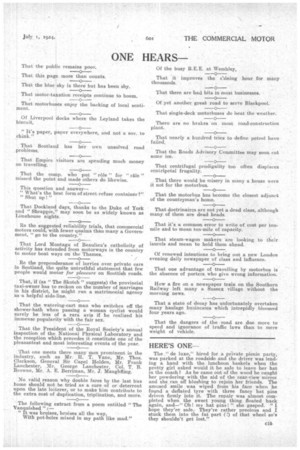ONE HEARS
Page 3

If you've noticed an error in this article please click here to report it so we can fix it.
That the public remains poor.
That this page more than counts.
That the blue sky is there but has been shy.
That motor-takation receipts continue to boom.
That motorbuies enjoy the backing of local sentiment.
Of Liverpool docks where the Leyland takes the biscuit.
" It's paper, paper everywhere, and not a soy, to chink."
That Scotland has her own unsolved road problems, That Empire :visitors are spending much money on travelling.
That the comp. who put " role " for " rale " missed the point and made others do likewise.
This question and answer " What's the best form of street-refuse container ?" "Shut up ! "
That Dockland days, thanks to the Duke of York and " Shrappie," may soon be as widely known as Limehouse nights.
Re the suggested reliability trials, that commercial motors could, with fewer qualms than many a Government, "go to the country."
That Lord Montagu of Beaulieu's catholicity of activity has extended from motorways in the country to motor boat ways on the Thames.
Re the preponderance of lorries over private cars in Scotland, the quite untruthful statement that few people would motor for pleasure on Scottish roads.
That, if (as " The Skotch " suggests) the provincial taxi-owner has to reckon on the number of marriages in his district, he might run a matrimonial agency as a helpful side-line.
That the watering-cart man who switches off the shower-bath when passing a woman cyclist would surely be less of a ram a a,vis if he realized his immense popularity with the fair sex.
That the President of the Royal Society's annual inspection of the National Physical Laboratory and the reception which precedes it constitute one of the pleasantest and most interesting events of the year.
That one meets there many men prominent in the industry, such as Mr. H. T. Vane, Mr. Thos. Clarkson, General Sir Capel Holden, Mr. Frank Lanchester, Mr. George Lanchester, Col. T. B. Browne, Mr. A. E. Berriman, Mr. J. Maughfling.
No valid reason why double fares by the last bus home should not be tried as a cure of or deterrent upon the late loiterer, or to make him contribute to the extra cost of duplication, triplication, and more.
The following extract from a poem entitled "The Vanquished" :— "It was bruises, bruises all the way, With pot-holes mixed in my path like mad." Of the busy B.E.E. at Wembley.
That it improves the elining hour for many thousands.
That there are bad bits in most businesses.
Of yet another great road to serve Blackpool.
That single-deck motorbuses do beat the weather.
There are no brakes on most road-construction plant.
That nearly a hundred tries to define petrol have failed, That the Roads Advisory Committee may soon cut some ice.
That centrifugal prodigality too often displaces centripetal frugality.
. That there would be misery in any a house were it not for the motorbus.
That the motorbus has become the closest adjunct of the countryman's home.
That doctrinaires are not yet a dead class, although many of them are dead heads.
That it's a common error to write of cost per tonmile and to mean ton-mile of capacity.
That steam-wagon re looking to their laurels and mean to ahead. h-7,ie-t—rhsema Of renewed intentions to bring out a new London evening daily newspaper of class and influence.
—0 That one advantage of travelling by motorbus is the absence of porters who give wrong information.
How a fire on a newspaper train on the Southern Railway left many a Sussex village without the morning news.
That a state of decay has unfortunately overtaken many haulage busincwies which intrepidly bloomed four years ago.
That the dangers of the road are due more to speed and ignorance of traffic laws than to mere weight of vehicle.














































